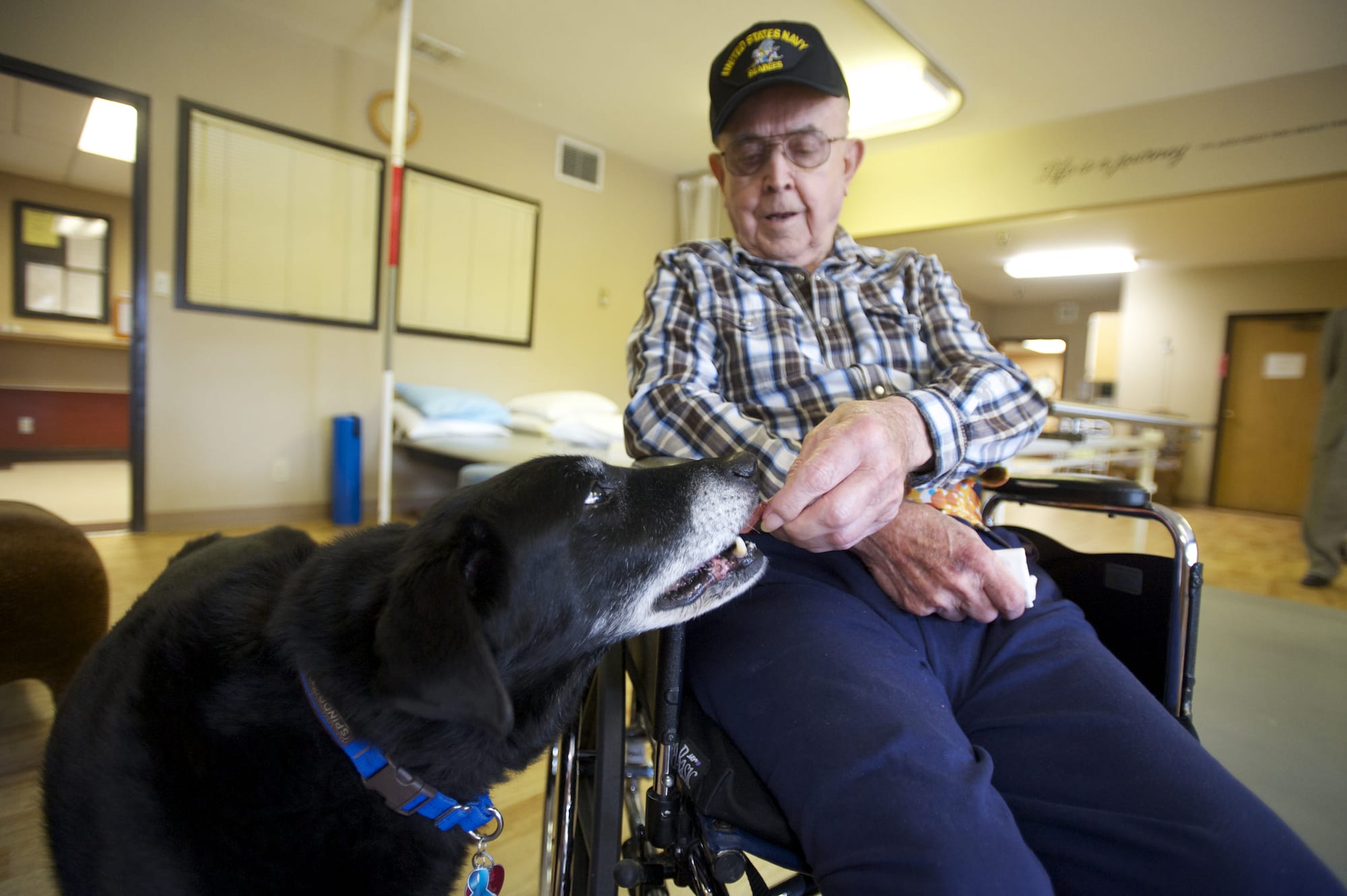Hobbled by a slight limp caused by arthritis of the hip, Luke ambled through the halls of Fort Vancouver Convalescent Center with the purposeful gait of a dog on a mission.
The healing process — often long, hard and painful — can be aided by the warmth of a furry body, the nuzzle of a wet nose and the slurp of a tongue. At least that’s the belief of Vicki and Randy Scheel, co-administrators of the center.
For the past 11 years, Luke, their pet, has walked the halls of the center, greeting patients with a smile and calm demeanor.
But Luke, the Scheels say, is nearing the end of his life. Over the years, Randy said, Luke has greeted more than 13,000 patients in his role as the center’s “director of hospitality.” Soon, the hard-working dog will become a patient. The next few weeks of rounds will likely be his last.
“This is what he loves,” Vicki said. “Truly, he does not like being home on the weekend unless we’re doing something constantly.”
Along with the ailing hip, Luke is partially deaf. At 14, he’s well into the golden years for a typical black Lab-malamute mix.
Around the center, patients know Luke as the gentle guy with a gray beard who’s smiling and looking for treats.
In one of the rooms, Jacki Knudson recalled when Luke met her father, Oswald Kaul, who was recovering from a stroke. Upon seeing the dog, her father’s face lit up.
“Luke knew why dad was coming here,” Knudson said. “Dogs have an innate sense about sick people.”
Kaul, 92, said he felt a connection with the dog.
“I just looked at him,” Kaul said, holding out a treat for Luke to snack on.
In another room, Duane McIntosh, 76, said having a dog at the center brightened the mood. He grew up with dogs and, while he now owns a cat, he has a soft spot in his heart for canines.
“He and I shared a treat,” McIntosh said. “Well, I gave it to him, and he ate it.”
While Luke is known for his outgoing demeanor, he wasn’t always that way, Vicki said.
She picked the dog up after seeing him running in the rain. Thinking he was a stray, she took him home. Randy, a self-described cat guy at the time, wasn’t too keen on keeping the dog. But when Luke’s owner practically insisted that the couple take him, they felt they had no other choice.
At first, he was shy and withdrawn. He wanted nothing to do with Randy.
“I think he was at least mildly abused by a guy,” he said. “When I would pick up a newspaper, he would cower. And Vicki said, ‘You really have to love up on him. Change your voice.’ And I said, ‘No, I just need to be me, and he’ll figure out I’m a good guy, too.’ Now, I can’t get rid of him.”
Not only did he open up to the Scheels, he became inseparable from them. He developed separation anxiety, which was the reason the Scheels started bringing him to work. At the center, Luke blossomed into a therapy dog, despite never receiving the training to be certified as such.
More than a decade later, as Luke’s body shows signs of irreversible atrophy, the Scheels plan to turn their office into a hospice for their dog. Their facility is a safe place for him. And while nothing at the convalescent home can heal his body, the Scheels say they know he’ll be comforted by remaining in the place he’s known as a second home for more than a decade.
Until that time comes, Vicki said, Luke will continue to use his canine intuition to comfort.
“He comforts families of people who are dying,” Vicki said. “And he teaches children it’s not a scary environment.”



